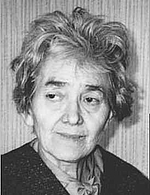Europa u boji. 1939 -1944
Info / context to the poem collection
"Europe in Struggle" is a collection of 47 poems and songs from eleven nations, created secretly in the Ravensbrück concentration camp in 1943/44.
The Czech women Vlasta Kladivová and Vera Hozáková were able to obtain the necessary material to write down the poems with ink on sheets of paper and to bind them as a book. They risked their lives with this clandestine activity, especially when they smuggled the book through the controls at the camp entrance.
The impetus for the collection, according to Vlasta Kladivová, was the poem Ghetto. The poem was written by a Polish woman whom the Nazis deported from a ghetto to Auschwitz-Birkenau, where she was murdered in the gas chamber. The note on which this poem was written had been found in a coat by a young Jewish girl who worked in the effects room [where the clothes and possessions of the arriving prisoners were kept]. This last legacy of a person whom the Nazis murdered in the gas chambers deeply touched Vlasta Kladivová.
Although the collection activity is mainly due to Vlasta Kladivová, it would not have been possible without the help of Vera Hozáková. Vera had arranged for Vlasta Kladivová to be assigned to work in the construction management office with her. Vera Hozáková, who had already arrived at Ravensbrück with the transport on 14 January 1942, was placed in construction management in the fall of 1943 since, as an architecture student, she had the necessary skills for the job. When her boss at the time allowed her to look for a woman as another assistant, she chose Vlasta Kladivová, who came to Ravensbrück from Auschwitz in August 1943 because, according to Vera Hozáková, she was at risk due to her weakened condition and because of her "thick glasses".
Vera Hozáková wrote down the poems from eleven nations in ink and provided the volume with illustrations. Some of her own poems also found their way into the collection. The book contains a table of contents that refers to the national origin of the poets, but names the author in only two cases. The omission of the author's name was intended to protect the women in case the book was discovered. But there was another reason: according to Vlasta Kladivová, it was the texts that were worth handing down. The authorship was of little importance because the texts, although authored by one woman, were the texts of all.
Vlasta Kladivová considers the poems as "documents for the atmosphere in the camp", as "testimony about the people who tried to survive under very difficult conditions". They still show "how difficult life was there and how people nevertheless tried to rise above it." The poems "represent people who were willing to fight for a better world" and testify to the "struggle for the ideals of humanity."
They kept the book hidden; in the last two or three weeks before the liberation Vera Hozaková tied the booklet around her body. She was lucky, it was not discovered. (C. Jaiser)
Vlasta Kladivová gave the book to the literary scholar Constanze Jaiser in the 1990s. Together with Jacob Pampuch and with the help of donations as well as volunteers who translated and recreated the texts, she was able to publish it as a facsimile for the 60th anniversary of the liberation of Ravensbrück:
Constanze Jaiser, Jacob David Pampuch (Hrsg.): Europa im Kampf 1939–1944. Internationale Poesie aus dem Frauen-Konzentrationslager Ravensbrück.
Faksimile, Begleitband und Hör-CD mit Stimmen von Überlebenden
Berlin, Metropol Verlag, 2005/2009




